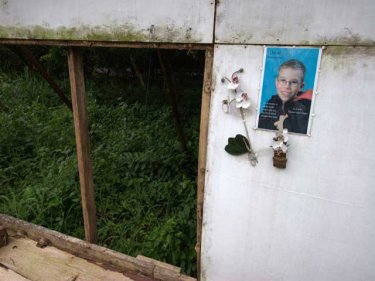Phuketwan Review
IN HIS new book, Marko Cunningham raises some of the issues that are constantly debated on English-language chat sites in Thailand.
Just how dangerous is this place and why are Thai and farang perspectives sometimes so different?
Marko, regular Phuketwan readers will recall, is the only westerner among the bodysnatchers of Bangkok, the Ruamkatanyu Foundation. That means he is often first on the scene of mishaps, accidents and tragedies of all kinds.
While his beat these days is a bit different, he still prefers to teach school by day and drive his own ambulance at night, and the book provides some chills and thrills.
''Sometimes I'm shocked to see how badly the human body can be mangled and still live,'' he writes.
''People often ask us how we handle it. Our answer is: 'We worked in the tsunami. Nothing could be worse.''' And that's really the relevance of this book for Phuket and Andaman coast dwellers, although Marko's perspective on police, politics and corruption in the capital is also extremely enlightening.
Marko's chapters on the tsunami provide perhaps the best public record yet of what it was like for the volunteers, gathering up the dead along the beaches and rocks and rubble, and later among the nameless thousands of bodies in two Buddhist temples, Wat Yan Yao and Wat Bang Muang.
The reaction of the Thais to the tsunami was remarkable. Hundreds of them came to the coast to help, as fast as they could. Forensic police from other countries shook their heads in amazement at this admirable aspect of Thai culture.
Explaining the deeper, individual differences is harder, and Marko certainly tries.
''Thais feel but don't show,'' he writes. ''To western eyes, Thais can seem cold and uncaring, but in fact they're just different.
''Partly, they don't feel this stuff as deeply; they have such a hard life anyway that a huge tragedy is just one of the little tragedies they face every day, scaled up.''
Woven through the book is his own personal search for affection and a liking for alcohol in large quantities. Both these aspects will be of considerable interest to many readers.
But this is not another book destined for the shelf marked, ''How to Romance a Thai.'' It's an honest account of the darker side of the human condition, mostly written from a place most of us have no desire to go.
When a siren sounds, the average person shrinks away. Not Marko. ''I love the ambulance at night,'' he writes. ''You become a zombie, just staring out the window watching the nightlife of Bangkok taking shape, looking at people and trying to guess their lives.
''Sometimes I catch myself hoping for an accident, actively wishing misfortune on others. I'm ready to go. I want to save someone's life!''
Now, that's one heck of a strange addiction.
His courage in confronting the worst that Nature and the night can deliver extends to his attitude to those he definitely does not admire: Thai police and politicians.
Unlike most of the chat-room critics, Marko has broad experience of what he is writing about. His intense disapproval of some aspects of Thai culture, especially corruption, is balanced by an appreciation of all that is generous and noble.
There are lessons in this book for any outsider who wishes to live among the Thais and is prepared to take the bad with the good.
Sleeping With the Dead, by Marko Cunningham. A Kiwi working with Bangkok's bodysnatchers. Random House new Zealand. Buy it online at: www.fishpond.co.nz
Visit Marko's Cunningham's own site at bkkfreeambulance.com
Bodysnatcher Profile Phuket has its volunteer foundations but Bangkok is noted for its Bodysnatchers, and Marko Cunningham is the only farang among them. He tells his story in a new book.
Confessions of a Farang Bangkok Bodysnatcher
Sleeping with the Dead: A Bodysnatcher Tells
Sleeping with the Dead: A Bodysnatcher Tells
Phuketwan on the 2004 Tsunami
Bodywork: How Tsunami Victims Reclaimed Names
The work by international police created the greatest forensic detective saga in history. Here is a report from the first 100 days.
Bodywork: How Tsunami Victims Reclaimed Names
The Tsunami: Week One Recalled
What was it like in that first week after the tsunami? Here one Phuket resident relates the story as it was reported in other places. This article has never appeared in print on Phuket.
The Tsunami: Week One Recalled
Water and Fire: A Tsunami Reunion
The poorest unidentified victims of the tsunami in Thailand are the ones who still have yet to be reunited with relatives. Here from 2007 is a report of one such reunion.
Water and Fire: A Tsunami Reunion
The Tsunami Toll One Year Later
The toll of the Indian Ocean tsunami is still misreported because of discrepancies that Phuketwan reporters discovered 12 months after the event. Here's what they wrote in 2005.
The Tsunami Toll One Year Later
Tsunami ID Cremation Mix-ups Trouble Families
The return of the wrong bodies to families of some tsunami victims is believed to be making the highly praised Thai Tsunami Victim Identification process even more complicated. PHOTO ALBUM
Tsunami ID Cremation Mix-ups Trouble Families
Tsunami Tourist Attraction Sinking Behind Sand
Piles of sand now obscure one of Phang Nga's most significant tourist attractions, the navy patrol boat that was swept inland during the 2004 tsunami; Phang Nga, Krabi resorts report occupancy.
Tsunami Tourist Attraction Sinking Behind Sand
Tsunami Wave Carries Powerful Memories
Photo Album Phang Nga was the epicentre of the big wave that devastated the Andaman coast on December 26, 2004. Four years on, the region reflects on the significance of the tsunami.
Tsunami Wave Carries Powerful Memories





Got the book, busy reading it and bravo, bravo, to all the Heroes who work with Marko. I salute you.
Posted by Graham on October 11, 2009 14:59